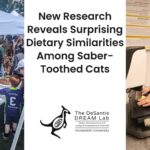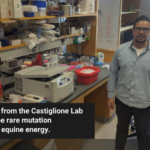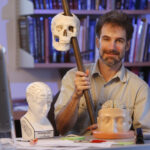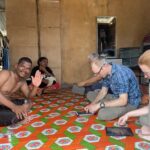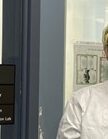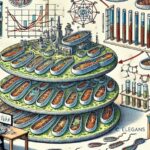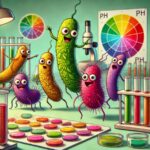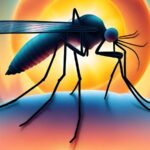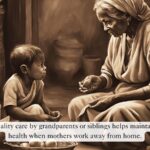Arts and Science
New Research Reveals Surprising Dietary Similarities Among Saber-Toothed Cats—Plus, Join Us for a Special Kids’ Day Event at Bridgestone Arena!
Apr. 4, 2025—Nashville, TN – April 4, 2025 – A innovative study led by researchers from Vanderbilt University sheds new light on the dietary ecology of the iconic saber-toothed cat, Smilodon. The study, published in a special issue on sabertoothed organisms in The Anatomical Record, reveals that Smilodon fatalis and Smilodon gracilis—two species that lived thousands to...
Castiglione Lab Discover Horses Run Faster by Ignoring an Ancient Mutation that Says ‘Stop’
Mar. 27, 2025—By Andy Flick, Evolutionary Studies scientific coordinator Evolution often makes a deal with the devil, creating challenges for treating human disease. By mass, the muscles of thoroughbred racehorses consume more than twice the oxygen of elite human athletes. Yet, oxygen produces free radicals, which damage organ tissues. Balancing energy production with oxidative stress is also...
Vanderbilt Researcher Finds Jewel Wasp Cocoons Can Withstand Cannibalism
Nov. 15, 2024—By Andy Flick, Evolutionary Studies scientific coordinator New research from Ken Catania, Stevenson Professor of Biological Sciences, shows another incredible result. The “Cocoon of the Developing Emerald Jewel Wasp (Ampulex compressa) Resists Cannibalistic Predation of the Zombified Host” was published in Brain, Behavior, and Evolution. Catania’s research program focuses on the weird in nature. His...
Beyond the Thrifty Genotype: Examining Evolutionary Hypotheses for Modern Metabolic Health
Nov. 12, 2024—By: Andy Flick, Evolutionary Studies Scientific Coordinator A new review co-led by graduate students Layla Brassington and Audrey Arner of the Lea Lab discusses the formulation of the popular and impactful Thrifty Genotype Hypothesis. This hypothesis, proposed by James Neel in 1962, suggests that fat deposition and energy conservation were once useful traits in times...
Ancient Bones, Modern Insights: Investigating Mercury Exposure in Colonial Peru
Nov. 11, 2024—By: Alexandria Leeper, Evolutionary Studies graduate communications assistant Sylvia Cheever, a Ph.D. student in Biological Anthropology at Vanderbilt University, is uncovering the hidden stories of indigenous communities affected by colonial exploitation in Peru. Supported by a pilot grant from the Vanderbilt Evolutionary Studies Initiative, Cheever’s research focuses on measuring mercury levels in ancient human bones...
Ken Catania to Present Evolution-focused, Spooky Halloween Talk
Oct. 1, 2024—By Danielle Bowden, Evolutionary Studies administrative specialist Nashville, TN –– Vanderbilt University’s Evolutionary Studies Initiative is thrilled to announce that distinguished evolutionary biologist Kenneth Catania will be delivering the Halloween Spooktacular Lecture as part of the ESI seminar series. Catania is a professor of Biological Sciences at Vanderbilt University. The lecture, titled “Science Lessons from...
Mitochondrial DNA Evolution: New Study Reveals How Selfish mtDNA Evolve and Thrive
Sep. 20, 2024—By Andy Flick, Evolutionary Studies scientific coordinator Vanderbilt University researchers, led by alumnus Bryan Gitschlag, have uncovered groundbreaking insights into the evolution of mitochondrial DNA (mtDNA). In their paper in Nature Communications titled “Multiple distinct evolutionary mechanisms govern the dynamics of selfish mitochondrial genomes in Caenorhabditis elegans,” the team reveals how selfish mtDNA, which can...
Evolved in the Lab, Found in Nature: Uncovering Hidden pH Sensing Abilities
Sep. 20, 2024—By Andy Flick, Evolutionary Studies scientific coordinator In a groundbreaking study led by Sarah Worthan, Ph.D., a postdoctoral researcher in the Behringer Lab at Vanderbilt University, scientists have successfully evolved microbial cultures that possess the ability to sense pH changes, enabling rapid responses to environmental fluctuations. Along with highlighting the power of lab-driven evolution, this...
Vanderbilt Researchers Find Warming Quickens Aging-Related Mortality in Mosquitoes
Sep. 19, 2024—By Andy Flick, Evolutionary Studies scientific coordinator Mosquitoes tread a thinning line in warming climates, where aging accelerates and infections intensify. New research shows that warming and aging act as a one-two punch, lowering mosquito lifespans and fanning the flames of bacterial infections. These findings highlight how climate change could alter the risks of disease...
Vanderbilt Anthropologist Explores How Different Childcare Models Affect Child Health in Working Families
Sep. 12, 2024—By Andy Flick, Evolutionary Studies scientific coordinator A new study co-authored by Monica Keith, Assistant Professor of Anthropology, provides insights into how different childcare models affect child health outcomes in working families. The research, focused on subsistence-based, semi-nomadic Shodagor communities in Bangladesh, highlights the crucial role of maternal care and effective substitutes in maintaining child...

